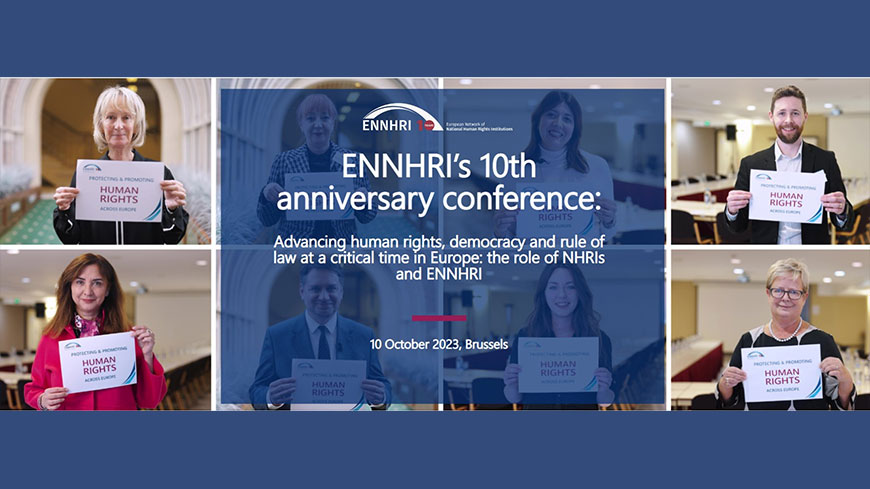Opening remarks by Dunja Mijatović at ENNHRI's 10th anniversary conference: "Advancing human rights, democracy and rule of law at a critical time in Europe: the role of NHRIs and ENNHRI".
"Dear all, dear friends,
I am sorry that I cannot be with you in person to celebrate the 10th anniversary of ENNHRI.
I really wanted to be with you as an expression of my Office’s long-standing attachment to the role of national human right institutions and our commitment to closely co-operating with them and supporting them.
30 years after the adoption of the Paris Principles by the United Nation General Assembly, the vision that national human rights institutions are instrumental to bringing international human rights standards to reality lives on today.
The vast majority of Council of Europe member states now have such a human rights institution.
As Council of Europe Commissioner for Human Rights, I am mandated to facilitate the work of national human rights structures. I take this responsibility seriously during my mandate, including by calling for the creation of NHRIs where they don’t exist yet; raising awareness about and defending them when under attack; and by holding regular exchanges of views with them.
Based on my work over the last few years, I have observed some key trends about human rights and the role of NHRIs
First, at a moment when Europe is experiencing worrying backsliding in human rights, it has been heartening to watch independent and effective national human rights institutions be true champions of human rights.
We have seen a rise in populism and nationalism and a clear backtracking by many governments regarding their human rights obligations.
I noticed that our voices have increasingly resonated and reinforced each other.
In some particularly difficult situations, I have been able to count on the assistance of NHRIs to carry out my mandate.
Secondly, national human rights institutions have shown that they can live up to the challenge and defend human rights even in serious human rights crises, such as the COVID-19 pandemic.
The war in Ukraine which has had devastating consequences for the lives and human rights of people in Ukraine. I want to pay tribute here to the Ukrainian national human rights institution, my friend Dmytro, who operates in incredibly dangerous security conditions. I also note the extraordinary mobilisation of NHRIs across Europe to ensure the human rights of Ukrainian refugees are upheld.
Turning to the third trend, I noticed that the voices, influence and impact of NHRIs have noticeably increased at the Council of Europe – which is very positive for the protection of the system of the European Convention on Human Rights.
Just last week, I was sitting next to an ENNHRI delegation, as we were both intervening as Third Parties in the groundbreaking case of Duarte Agostinho and others v. Portugal and 32 other states in which young people have taken their case relating to the right to a healthy environment to the European Court of Human Rights.
I also want to salute your role, through representation by ENNHRI, in taking a principled position regarding the Oviedo Protocol so that it would not create a conflict with the Convention on the Rights of Persons with Disabilities. NHRIs are also playing a key role in debates that are some of the most vital in the protection of human rights today, for example in the framework of the preparation of the Council of Europe Convention on Artificial Intelligence.
Finally, I have observed a marked increase in threats and attacks against national human rights institutions.
These have included death threats by third-state actors; undue budget reductions; illegal dismissal of heads of institutions and/or unjustifiable delays in the appointment of new heads; inappropriate public criticism by politicians; and judicial harassment.
The functioning of national human rights institutions is a clear indicator of the state of respect for the rule of law and human rights in a country. It is much harder to be effective in the absence of an enabling environment. The leadership of NHRIs in particular bears the enormous responsibility of defending the independence and efficiency of their institutions.
Let me conclude with a brief look at the way ahead.
The world today requires even more courage and independence to defend human rights – I am well-placed to know that this is not easy. It is very important that national human rights institutions build institutional resilience to face these challenges.
In this regard, the Council of Europe Committee of Ministers’ Recommendation 2021(1) on strengthening NHRIs contains important standards, and the Commissioner will continue to call on Council of Europe member states to live up to their own commitments to have strong, independent and effective NHRIs.
Importantly, at the recent Reykjavik summit, Heads of States acknowledged that NHRIs are a bulwark for freedom, human rights and European values and encouraged the Council of Europe to increase its co-operation with them.
I am convinced that co-operation, exchanges of good practices and a focus on synergies will be the key to more impact moving forward. I know that you cultivate this approach within your network ENNHRI.
I can assure you that my Office is committed to continuing to strengthen our engagement with NHRIs.
I also believe it will be essential for all of us to improve the way we reach out and enlist others in society in this endeavour, including the youth, civil society and human rights defenders, and all members of the public.
With courage, resilience and solidarity, we will continue to carry high the flame of human rights."



